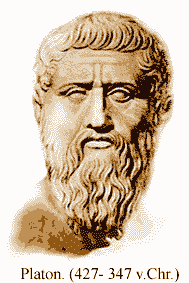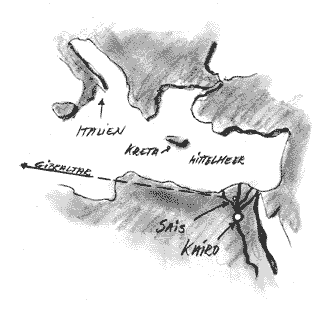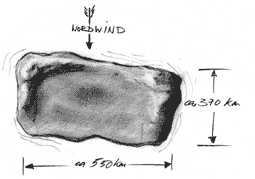Myth of Atlantis
The background
(written by K. Eichhorn. Original article here)Prologue
Atlantis... how many times did we already hear this word, but- what is it really? Many fairytales are told about a so called "sunk continent" and mix up with speculations over a prehistoric super-civilization with nukes or the imagination of mega-cities on the ground of the ocean. But where does the story come from? This essay will let you know who is the original author of the Atlantis-report and gives a short glimpse on the newest reseach results.
Atlantis... marketplace of the prophetes
It is extraordinary important to know, that this subject is discussed by several totally different groups. Nearly noone is aware of the fact that the famous greek philosopher Plato (427-347 B.C.) is the author of the genuine texts. They are a part of Plato's final work, that can be estimated as a kind of encyclopedia, in which he tries to summarize the whole knowledge of the ancient times. These two short cutouts, named "Timaios" and "Kritias" are the only text that surely refer to the theme Atlantis!

There are other ancient documents that seem to have a certain similarity to Plato's description, but if a passage out of Homer's Odyssee (900 B.C.) that describes the country of the "Phäaken" means the same is absolutely not assured. Neither the reports of Herodot of Halikarnassos nor the big flood story out of the bible may be compared to Plato's original texts, because no provable relationship can be taken for guaranted. This is the reason why it has to be explicitely noticed, that nothing else but Plato's reports are the only historic source for a scientific research dealing with the subject Atlantis.
Mainly responsible for the confusion about Atlantis is the camp of the esoteric-scene. In the twenties of the last century a magician named Edgar Cayce inspired his audience as a wonder doctor and hypnotist. While having mysterious seances he made the prophecy that Atlantis will reappear in front of the island Bimini at the end of the century. He said Atlantis was destoyed by nuclear weapons and described some strange Aircrafts. Additionally Madame Helena Blavatzki, who was the founder of the theosophic doctrine related the fictional islands "Lemuria" and "Mu" to Atlantis and was later on supported by other self-styled channel-medias. If their transmission from the herafter have a real background or describing "another" Atlantis can not be decided--- but as a matter of fact they have nothing to do with Plato's genuine manuscripts.
These two influences led automatically to an explosive mixture out of real science, half-heartet curiosity and esoteric speculation. The subject Atlantis degenerated to a chaotic myth for mentally disturbed people and other weired personel. And finally the abuse for ideologic reasons, as well as numerous freely invented phantasy-films extinguished all kind of seriousness from this historic narration.
This essay will help to transform the existing confusion into knowledge.
Atlantis... the real origin
With about 70 years Plato writes down his mainwork, that is a summary of knowledge of his times. It consits out of the collection dealing with the pytharogrean medicine, physiology, psychology and astronomy. Only two pasages out of this work, the dialogues "Timaios" and "Kritias" name for the first time ever in the history of literature the word "Atlantis". Everything, that follows in later times dealing with the expression Atlantis is based on Plato's description as a model. But this term is explicitely declared by Plato as a translation from the egyptian language and the original meaning is totally unknown (the greek translation is "daughter of Atlas"). But where did Plato get his informations from?

Plato himself names the source of his informations within the dialogues. It was Solon (640-559 v.Chr.), another historic person and one of the founders of the athenic state-democracy. He brought these texts from a voyage to egypt. Confirmed by the genealogic researches of John Davies, Solon was the grandfather of Kritias, while Kritias was the uncle of Plato. Solons notes have been handed over between these historic persons until they were finally used in Plato's mainwork.
About Solon there are many details known. He was famous for his numerous travels, that he undertook as a tradesman. In order to get to know the customs, the law and the history of foreign cultures he went about 560 B.C. to egypt, where he visited the town "Sais" in the delta of the river Nile. There has been the "Temple of Neith", that had the image of beeing the most important university of this epoch. In this temple he found some statues with engraved texts dealing with Atlantis. He asked the priests about this story and was abundantly answered by them. By using further papyrus-rolls they told him the story about Atlantis. Out of these informations he made the paper, that was later on given to his great-nevew Plato.
The existance of the Temple of Neith has already been proved by archeological excavations. Solon's trip to the haven of Naucratis, that is in a distance of 16 kilometres to the ancient town Sais is historicly confirmed. About 300 B.C. "Crantor of Soloi" also travels to this temple and witnesses to have seen this particular papyrus-rolls, before the romans destroyedthe temple about three centuries later.
The basic content of Timaios and Kritias
First of all we have to remark that for an estimation of the real content of Plato's texts, any influence of the Atlantis-hysteria of the 20th century must be completely excluded. In order to do that, it is necessary to use translations that have been made before 1920. This is the case for the book "Emergency Atlantis", that uses a transmission into the german language out of the year 1856, done by Hieronymus Mueller in Leipzig (Germany).
The dialogue "Timaios" is a talk between Sokrates and Timaios, wherein Timaios tells what Kritias said about Solon's sojourn in Sais. Solon shall have been told by the egyptian priests, that the greek culture is much older than they thought themselves. Their mythologie is nothing else but a fairytale and the reason for it is, that the knowledge of the real circumstances got lost 9.000 years before (i.e. Date of Solon's stay minus 9.000 = 9.560 B.C.) Timaios repeats the conversation between Solon and the priests, that deals with military actions between the proto-greeks and the atlantic people. The atlantic people are described as an advanced culture that managed to dominate the whole mediteranian area at this time. Later on their island shall has been extinguished by a flood and a giant earthquake.
In the dialogue "Kritias" this historicel person talks about what he already heard as a child from his grandfather Solon. He emphasizes that all the names are translations and the audience should not wonder why the atlantic-people had hellenic names. After that starts an extraordinarily detailed description of the island Atlantis, as well as facts about position, form, climate, mineral resources, fauna, and so on. In the same pecision is the capital of Atlantis described, even with exact measurements. It follows a portray of the customs of the atlantic-people, as well as for the number and equipment for the complete army. It ends up with special rituals of the royals and is not exceedable in the sharpness of description.
Both dialogues together fill less than 6 pages. Even though that is already all they are extremely exact and deliver incredible particularities about dimensions, topographics, geology, meteorology and a number of other scientific disciplines. Not only the placement of texts in Plato's encyclopedia leads to the conclusion that this narration is a historic report. Several times, within the dialogues, the protagonists themselves explicitely say that this is not an invented fairytale, but the historic truth.
Newest researches
The following passage is based on the work of an anonymus author named a.petit and may be seen as a clear recommendation. In his manuscript "Emergency Atlantis" he easily reveals some central mistakes that have been made while searching for the so called "sunk" Atlantis. This book will be an emergency for 2.400 years of science, too. Here some examples;
By analysing the genuine texts in a linguistic way a.petit can prove that Atlantis never has been designated as a continent. Instead it is described as an island with a plateau of a certain size (550x370 kilometres).

There is just one single expression that can lead to a misinterpretation. But this only if you do not use a translation that is written before1920. In later editions you can read "(Atlantis was) ...an island, that was bigger than Asia and Libya together..."
But the real meaning, as you can find it in Hieronymus Mueller's translation is
"(Atlantis was) ...an island, that was more mighty than Asia and Libya together..."
The greek word that is written at this position in Plato's genuine texts is "meizon". And this word has the meaning of "more important" and "more mighty"!!! Already at this point of analysis all the encyclopedias that list Atlantis as a continent should be corrected!
Additionally must be remarked that Atlantis does not have to be situated in the atlantic-ocean, because these waters got their name (as well as the atlas-mountains) a long time later- and this because of the interpretation of the narration of Plato. The first mentioning of the atlantic- ocean is made by Herodot of Halikarnassos (484-425 B.C.) He had the imagination that the whole world was surrounded by an unknown ocean that he called "Atlantic" (greek: Atlantěs thálassa =Ocean of Atlas). But at the same time he describes "atlantic-people" who live in the south-east of the Atlas-Mountains that are situated at the mediterranian coast in Libya (!)
The reason for the estimation Plato's Atlantic-Ocean is the one of today is a textpassage where you can read that Atlantis should have been situated "beyond" the Pillars of Heracles. This is undoubtely a later designation for Gibraltar (Spain), but in the origin it is just an expression for any sea-strait. For example for the ancient haven of Cyprus, too. Another point is that Plato has written in his texts "pro stoma", what not only means beyond, but also means "in front of" the Pillars of Heracles. So the conclusion that Atlantis was in the atlantic-ocean of our modern times is not necessarily right.
In the Atlantis-text there is the speach of a landscape named "Gadeiros", that is for many people equal to the greek expression "Gadeiros". This is todays spanish city of "Cadiz", next to the Pillars of Heracles. But those who keep it for the same forget, that Plato explicetely says that "Gadeiros" an expression out of the unknown atlantic language is. And that is why it can never be greek!!!
Anyway "Gadeiros" was a landscape in the size of a whole kingdom and everything else, but an ancient city. So this is another resultless trace that confused the science until now.
If we analyse the words Plato uses in his texts it is conspicious that he uses the expression "sea" for everything that is liquid. If saltwater, drinkwater, rivers or rain - he does not care. This is the reason why the sentence "... Atlantis sank in the sea ..." gets a totally different meaning. Atlantis does not have to have sunk in a salty ocean, Atlantis can be destroyed by nothing but rain and inondations!
Especially when we read the sentence with its context we get another astonishing result. The whole sentence is
"But afterwards occurred violent earthquakes and floods and in a single day and night of misfortune all your warlike men were swallowed by the earth (the first greeks), and the island of Atlantis in like manner disappeared in the depths of the sea ..."
What does that mean?
If the the ancient Greece was only destoyed by earthquakes and flood, and their landmass did not lower (like it is said in the texts), and Atlantis was destroyed in like manner, the Atlantis-island did not sink, either! But in the next sentence follows the most interesting confirmation of this thesis;
... For which reason the sea in those parts is impassable and impenetrable, because there is a shoal of mud in the way; and this was caused by the subsidence of the soil."(equivalent to H. Mueller 1856)
After the catastrophe the island Atlantis can not have been lower, than the sea which is now burried by its soil. But the text also sais Atlantis was just no more accessible- that means logically not sunk!
After the catastrophe the island Atlantis can not have been lower, than the sea which is now burried by its soil. But the text also sais Atlantis was just no more accessible- that means logically not sunk!
.....Atlantis still existed after the catastrophe !!!
Result
These were only some of the astonishing reconnaissances, but the series fills -like I already mentioned- a whole book. This is why I recommend to an interested audience the manuscript of an anonymus author, who works under the pseudonym a.petit. It will help to clean up the phantastic fictions about Atlantis. He himself possesses even more incredible evidences and claims to be as surprised as I am, or you will be....
K.H. Eichhorn